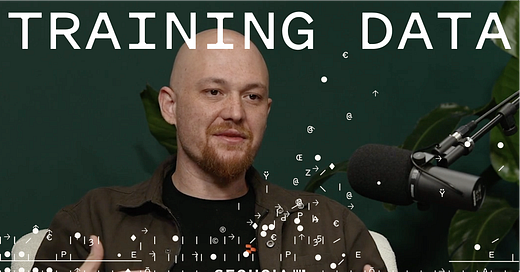Post methodology: Claude 3.7 via custom Dust assistant @TDep-SubstackPost with the system prompt: Please read the text of the podcast transcript in the prompt and write a short post that summarizes the main points and incorporates any recent news articles, substack posts or X posts that provide helpful context for the interview. Please make the post as concise as possible and avoid academic language or footnotes. please put any linked articles or tweets inline in the text. Please refer to Podcast guests by their first names after the initial mention. Light editing and reformatting for the Substack editor.
In this episode, Replit founder and CEO Amjad Masad shared his vision of empowering a billion developers worldwide – a goal he's pursued for over a decade. This vision stands in contrast to the common Silicon Valley narrative about AGI replacing human workers.
The Billion Developer Vision
Amjad's journey began in Jordan, where he started programming at age seven, creating educational software for his younger brother (who now works at Replit). His mission has always been to democratize software creation by removing unnecessary complexity.
"Making software is the natural thing to do on a computer," Amjad explains. "I was actually surprised that this is the domain of the expert as opposed to this thing that anyone can do."
Economic Transformation
Amjad believes a world with a billion developers will fundamentally reshape the economy. When everyone can create software, the traditional pipeline model of companies changes to a network model. Generalist problem-solvers will use AI to solve issues across departments without needing specialized technical teams.
He shares a powerful example of this transformation: a university student in India learned to code on Replit using only his Android phone, and then earned more money through Replit's bounties platform than his entire family would make in a year.
The Agent Revolution
The launch of Replit Agent in September 2023 marked a transformative moment for the company. After years of preparation, Replit created one of the first working software agents that can build complete applications from natural language prompts.
In a recent Semafor interview, Amjad revealed that Agent had quintupled Replit's revenue just months after its launch. "It was a huge hit," Amjad said. "It's basically the first at-scale working software agent you can try in the world today."
The Coding Controversy
Interestingly, despite building a platform that teaches coding, Amjad recently made headlines by suggesting that learning traditional coding might soon become pointless. "I no longer think you should learn to code," he wrote on X, suggesting that as AI increasingly generates code, the focus should shift to problem-solving and clear communication skills.
https://x.com/amasad/status/1905103640089825788
This statement sparked debate, with Amjad later calling it a "bittersweet realization" after spending years popularizing coding through Codecademy and Replit.
JUMP TO: Don’t Code, Just Vibe
Looking Forward
As AI capabilities advance, Amjad sees Replit evolving from a platform for professional coders to one that empowers anyone who can use a spreadsheet to create software. "The difference between programmers and non-programmers is collapsing rapidly," he told Semafor, "and lay people will have the opportunity to have as much command over computers as hackers do today."
For Amjad, this vision represents a return to computing's original promise – where everyone could be both a creator and user of software – and a future where technology's benefits are distributed more equitably across the global economy.
Hosted by David Cahn and Sonya Huang
Mentioned in this episode:
On the Naturalness of Software: 2012 paper on applying NLP to code
Attention Is All You Need: Seminal 2017 paper on transformers
I Am a Strange Loop: 2007 follow up to Douglas Hofstadter’s 1979 classic Gödel, Escher, Bach that explores how self-referential systems can describe minds
On Lisp: Paul Graham’s 1993 book on the original programming language of AI












Share this post